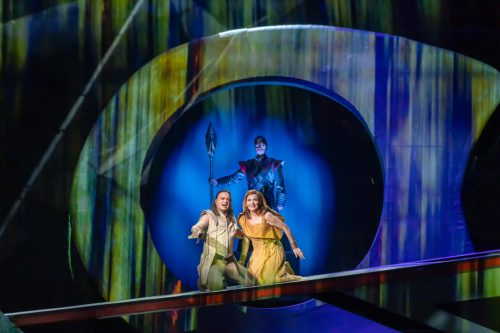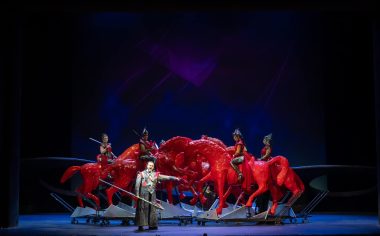Sofia Opera’s revived Ring cycle continues with a terrific Die Walküre – Seen and Heard Worldwide
 Bulgaria Wagner, Die Walküre: Soloists, Orchestra of Sofia Opera and Ballet / Evan-Alexis Christ (conductor). Sofia Opera, 16.6.2024. (GT)
Bulgaria Wagner, Die Walküre: Soloists, Orchestra of Sofia Opera and Ballet / Evan-Alexis Christ (conductor). Sofia Opera, 16.6.2024. (GT)

Die Walküre has essentially the most thrilling Prelude of any Wagner opera in instantly gripping the listener and making ready them for what’s to return. On the coronary heart of the drama are the extreme dialogues between the central characters during which they’re reworked from being strangers to changing into lovers, and however, between the male characters, there seem feelings of mistrust and suspicion and finish in demise for a few of them. In the end, redemption emerges as the best power within the stage work.
Within the transient Prelude, the curtains revealed Siegmund pursued by Hunding’s males making ready us for what was to return. The units modified to a terrific, triangular construction of Hunding’s dwelling, and past is a pathway and one other nice triskel. Within the opening scene, when Sieglinde finds the stranger in her dwelling, there may be a very stunning solo passage on the cello, which is the tragic love motif from Das Rheingold and is a portent of the connection between her and Siegmund. Her phrase ‘Dies Haus und dies Weib sind Hundings Eigen’ displays on her unhappy destiny in a loveless union. After giving Siegmund a drink, she unveils her eager for love and there shall be additional proof of her burgeoning emotions for Siegmund. Tsvetana Bandalovska was excellent in her portrayal of the lonely, loveless lady.
The portrayal of Hunding by the marvellously darkish bass of Icelandic Bjarni Thor Kristinsson was excellent whose each phrase revealed wickedness and threatening presence. This was particularly as he notices the likeness of his spouse and Siegmund. Sieglinde, as so typically occurs in Wagner’s operas, affords a potion to place her husband to sleep earlier than he may cause hurt. The glances exchanged between the 2 are splendidly portrayed and superbly accompanied by the woodwind, earlier than the sword motif from Das Rheingold (overview right here) is heard from the trumpet, oboe and the cor anglais, resulting in Siegmund reflecting on his father’s promise of his sword, ‘Ein Schwert verhiess mir der Vater’ and united with Sieglinde she exhibits him the sword and their declaring love is superbly portrayed with excellent orchestral taking part in to her singing, ‘Du bist der Lenz’ and by Siegmund’s ‘O susseste Wonne!’
A power of the casting was within the Wotan of the Greek singer Aris Argiris and matched by the portrayal of Mariana Tsvetkova’s Fricka. Portraying the fervour of Sieglinde and Siegmund, it was as if the singers had lived in these roles for years – so reasonable had been their characterisations. Kristinsson’s Hunding has a deep threatening bass and was fearsome in facial and bodily actions; the orchestra was glorious with a number of superb virtuoso solos from the woodwind, and particularly by a solo cello accompanying Wotan. Conductor Evan-Alexis Christ’s tempos ensured a fast tempo of the motion and evincing more and more dramatic accompaniment to the singing. In Act II, within the dialogue between father and daughter, Wotan revealed his excellent voice, deep and clear, and the Brünnhilde of Gergana Rusekova was particularly superb, each expression revealing emotive feeling from anger to tenderness. As he sang, there appeared visions of figures from the previous in one of many nice uplifted triskels within the background, a very efficient system by Plamen Kartaloff on this revival.

Because it was in final 12 months’s efficiency, essentially the most thrilling scene was on the opening of Act III with the entry of the eight Valkyries on their crimson horses, and if something, their motion on stage was higher choreographed than earlier than – particularly of their defending Brünnhilde and Sieglinde from the wrath of Wotan.
Most of all, it Rusekova’s Brünnhilde who offered one of the excellent vocal and performing performances of the night; her interpretation and characterisation of Brünnhilde has developed marvellously since final 12 months and he or she has the superbly seamless voice for this half. Her costume additionally enhanced her efficiency with a darkish scarlet and lightweight gray gown – she was Brünnhilde and hers was one of many nice performances over your complete cycle.
Rusekova was matched by the Wotan of Argiris, whose stage presence and singing had been highlights. Argiris was magisterial in his nice moments, particularly within the ‘Leb’ wohl’ in Act III as he provides his farewell to his daughter Brünnhilde. Argiris gave a spectacular vocal and performing efficiency. Kristinsson’s Hunding was terrific all through, and I can not bear in mind a extra convincing portrayal of this depraved and tyrannical determine; in each phrase there was menace, and the killing of Siegmund was reasonable in its brutality.
One other excellent efficiency was Tsvetana Bandalovska’s Sieglinde, and this 12 months, much more so than final 12 months, she gave a whole realisation of the maligned spouse; her face revealing her concern and suspicion, of discovery and love, her response to the horrible homicide of her brother and lover Siegmund, and at last her radiant singing of ‘O hehrstes Wunder!’ in Act III. Martin Iliev once more was a terrific Siegmund, marvellously portraying the determined refugee from Hunding’s warriors. He has a stupendous tenor appropriate for heldentenor roles, even when not of the best vary, he’s nonetheless a powerful singer.
Mariana Zvetkova, as Fricka, gave a masterly portrayal in her chastising of Wotan, and her singing was matched by nuanced actions and her ever-so-delicate eye expression. The orchestra had been as soon as once more excellent, with nice solo passages at essential moments, and Evan-Alexis Christ produced an impressive efficiency from them and managed to current a barely completely different Wagnerian sound than that heard final 12 months underneath Constantin Trinks – it was extra thrilling and intense, significantly within the nice scenes on the stage. The costumes by Hristiyana Mihaleva-Zorbalieva had been magnificent and the tailoring mixed with their color schemes suiting the completely different characters and their tales, while the lighting by Andrej Hajdinjak and the multimedia by Ivan Lipchev and Elena Shopova had been an added dimension making this efficiency typically sensational in its extraordinary dramatic narrative.
In all, this was a terrific staging and as soon as once more demonstrated the excellent skills of this firm; virtually all of the principal soloists had been Bulgarian; most notably Rusekova’s Brünnhilde and Bandalovska’s Sieglinde, Zvetkova’s Fricka and Iliev’s Siegmund. This manufacturing has been seen in Bavaria, South Korea, and in North Macedonia, all to nice acclaim. Hopefully, it would journey extensively throughout Europe in coming seasons, in lots of elements it’s revelatory.
Gregor Tassie
Manufacturing:
Course – Plamen Kartaloff
Assistant Director – Yulia Krasteva
Set designer – Hans Kudlich
Costumes – Hristiyana Mihalev-Zorbalieva
Lighting design – Andrej Hajdinjak
Multimedia – Ivan Lipchev, Elena Shopova
Constructive growth – Georgi Georgiev
Design and Construction – Boryan Belchev
Artist – Christiyan Stoyanov
Forged :
Wotan – Aris Argiris
Fricka – Mariana Zvetkova
Siegmund – Martin Iliev
Hunding – Bjarni Thor Kristinsson
Brünnhilde – Gergana Rusekova
Sieglinde – Tsvetana Bandalovska
Helmwige – Stanislava Momekova
Ortlinde – Silvia Teneva
Gerhilde – Lyubov Metodieva
Waltraute – Ina Petrova
Siegrune – Elena Mehandzhiyska
Rossweisse – Tveta Sarambelieva
Gringerde – Alexandrina Stoyanova-Andreeva
Schwertleite – Vesela Yaneva
